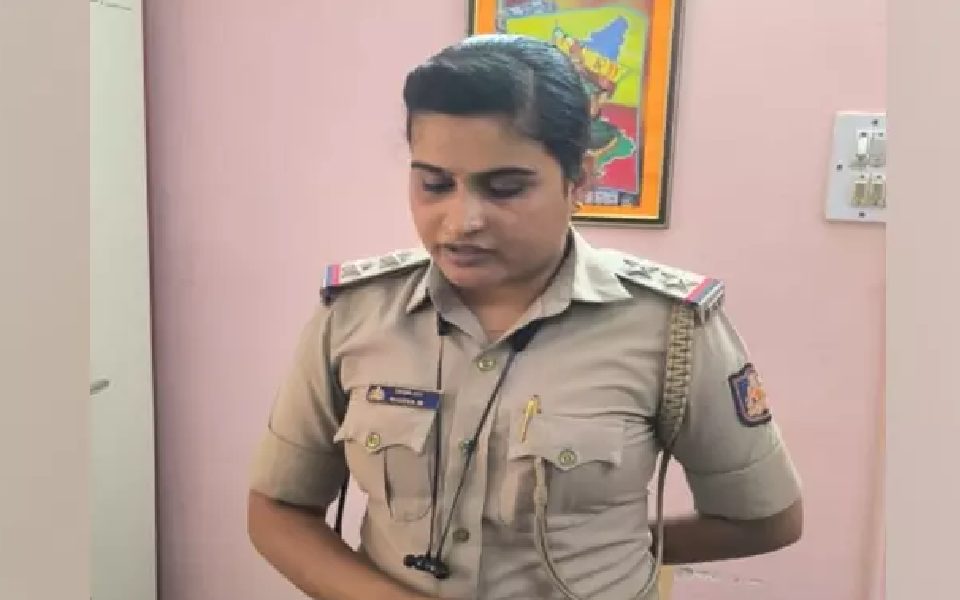Mysuru: In a crackdown on corruption, Inspector Radha of Kuvempunagar Police Station in Mysuru was caught red-handed by the Lokayukta Police while accepting a bribe in connection with a case.
The incident took place when Inspector Radha allegedly demanded a bribe from a contractor whose cars had been seized by the Kuvempunagar police. The vehicles contained gold ornaments, property documents, a bank passbook, and an ATM card. In return for the release of the cars with the valuables, Inspector Radha demanded a bribe of Rs. 2 lakh.
Following this, the contractor lodged a complaint with the Lokayukta police on Thursday. Acting on the complaint, the Lokayukta Police conducted a raid at the Kuvempunagar Police Station and arrested Inspector Radha while she was accepting Rs. 50,000 as part of the bribe.
ALSO READ: Bidar: Case filed against 25 after clash between engineering college students
The operation was executed under the supervision of Lokayukta Director General of Police Prashant Kumar Thakur and Inspector General of Police Subrahmaneswara Rao. The team included Superintendent of Police Sajeet VJ, DYSP Krishnaiah, and several police inspectors from the Mysuru Lokayukta Police Station, including Umesh, Jayaratna, Rupashree, Ravikumar, Ramesh, Gopi, Kantaraju, Prakash, Mohangowda, Veena, Pushpalatha, Divyashree, Netravathi, Pradeep, Parasurama, Mohan, and Lokesh.
Inspector Radha has been taken into custody by the Lokayukta Police, and further investigations are underway.
Let the Truth be known. If you read VB and like VB, please be a VB Supporter and Help us deliver the Truth to one and all.
Panaji (PTI): As part of a crackdown against tourist establishments violating laws and safety norms in the aftermath of the Arpora fire tragedy, Goa authorities on Saturday sealed a renowned club at Vagator and revoked the fire department NOC of another club.
Cafe CO2 Goa, located on a cliff overlooking the Arabian Sea at Vagator beach in North Goa, was sealed. The move came two days after Goya Club, also in Vagator, was shut down for alleged violations of rules.
Elsewhere, campaigning for local body polls, AAP leader Arvind Kejriwal said the fire incident at Birch by Romeo Lane nightclub at Arpora, which claimed 25 lives on December 6, happened because the BJP government in the state was corrupt.
An inspection of Cafe CO2 Goa by a state government-appointed team revealed that the establishment, with a seating capacity of 250, did not possess a no-objection certificate (NOC) of the Fire and Emergency Services Department. The club, which sits atop Ozrant Cliff, also did not have structural stability, the team found.
The Fire and Emergency Services on Saturday also revoked the NOC issued to Diaz Pool Club and Bar at Anjuna as the fire extinguishers installed in the establishment were found to be inadequate, said divisional fire officer Shripad Gawas.
A notice was issued to Nitin Wadhwa, the partner of the club, he said in the order.
Campaigning at Chimbel village near Panaji in support of his party's Zilla Panchayat election candidate, Aam Aadmi Party leader Kejriwal said the nightclub fire at Arpora happened because of the "corruption of the Pramod Sawant-led state government."
"Why this fire incident happened? I read in the newspapers that the nightclub had no occupancy certificate, no building licence, no excise licence, no construction licence or trade licence. The entire club was illegal but still it was going on," he said.
"How could it go on? Couldn't Pramod Sawant or anyone else see it? I was told that hafta (bribe) was being paid," the former Delhi chief minister said.
A person can not work without bribing officials in the coastal state, Kejriwal said, alleging that officers, MLAs and even ministers are accepting bribes.





